新概念英语第二册课后练习答案
新概念英语第二册课后习题答案详解(整理打印版)

新概念英语第二册课后习题答案详解(整理打印版)Lesson 11.b 选b 最为正确。
因为a.d.都与课文内容不符合,也不合乎逻辑;c.的意思是“他们没有注意他”,而作者的意图并不是想让他们注意他,而是想让他们停止谈话。
所以选 b.最能表达作者当时心里的感受。
2.c 其余3 个答案都与原句意思不符合。
3.b 因为a. to 不对,可以是He went to the theatre;c. into也不对,可以是He went intothe theatre;d. on 更不符合语法,表示在某一个地方用介词in 或at, in表示在大的空间,如国家,城市等,at则表示在小的地点或空间,如atthe office, at the theatre等, 所以选b.是正确的。
4.db. above( 在,, 上方);c. ahead of (在,, 的前面,在,, 之前)不和behind对应,也不强调位置的前后顺序。
a. before和d. infront of都是和behind 对应的,都有“在,,前面”的意思。
但in front of更具体的强调位置,而before 则包含更宽泛的意思,即时间上,空间,次序,登记,重要性方面的“在,, 前面”5.c 因为用a. Where, b. why, d. when提问都不符合逻辑,都不是针对状态提问的,只有How 提问,才能用Angry 回答。
6.ab. they只做主语;c. their 只能做定语;d. us 虽然可以做宾语,但与前一句意思不符合。
7.da. none是代词,很少用在名词前面;b. any只能用在否定句或疑问句中;c. not any不符合语法,因为前面没有助动词did.8.ba. chair( 椅子),c. armchair( 手扶椅) d. class(班级) 这3 个选择都和seat 的意思不符合。
Seat 是”座位,座席”的意思。
强调的是可供坐下的地方,不是具体的椅子。
新概念英语第二册课后习题答案详解_1-40
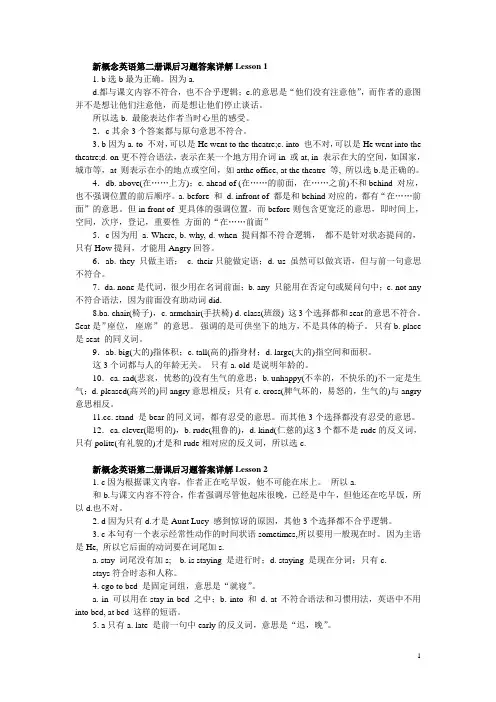
新概念英语第二册课后习题答案详解Lesson 11. b选b最为正确。
因为a.d.都与课文内容不符合,也不合乎逻辑;c.的意思是“他们没有注意他”,而作者的意图并不是想让他们注意他,而是想让他们停止谈话。
所以选b. 最能表达作者当时心里的感受。
2.c其余3个答案都与原句意思不符合。
3.b因为a. to 不对,可以是He went to the theatre;c. into 也不对,可以是He went into the theatre;d. on更不符合语法,表示在某一个地方用介词in 或at, in 表示在大的空间,如国家,城市等,at 则表示在小的地点或空间,如atthe office, at the theatre 等, 所以选b.是正确的。
4.db. above(在……上方);c. ahead of (在……的前面,在……之前)不和behind 对应,也不强调位置的前后顺序。
a. before 和 d. infront of 都是和behind对应的,都有“在……前面”的意思。
但in front of 更具体的强调位置,而before则包含更宽泛的意思,即时间上,空间,次序,登记,重要性方面的“在……前面”5.c因为用a. Where, b. why, d. when 提问都不符合逻辑,都不是针对状态提问的,只有How提问,才能用Angry回答。
6.ab. they 只做主语;c. their只能做定语;d. us 虽然可以做宾语,但与前一句意思不符合。
7.da. none是代词,很少用在名词前面;b. any 只能用在否定句或疑问句中;c. not any 不符合语法,因为前面没有助动词did.8.ba. chair(椅子),c. armchair(手扶椅) d. class(班级) 这3个选择都和seat的意思不符合。
Seat是”座位,座席”的意思。
强调的是可供坐下的地方,不是具体的椅子。
新概念英语第二册课后答案
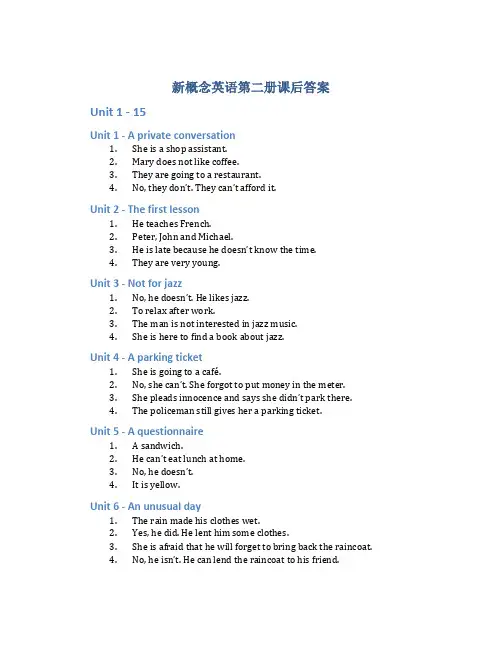
新概念英语第二册课后答案Unit 1 - 15Unit 1 - A private conversation1.She is a shop assistant.2.Mary does not like coffee.3.They are going to a restaurant.4.No, they don’t. They can’t afford it.Unit 2 - The first lesson1.He teaches French.2.Peter, John and Michael.3.He is late because he doesn’t know the time.4.They are very young.Unit 3 - Not for jazz1.No, he doesn’t. He likes jazz.2.To relax after work.3.The man is not interested in jazz music.4.She is here to find a book about jazz.Unit 4 - A parking ticket1.She is going to a café.2.No, she can’t. She forgot to put money in the meter.3.She pleads innocence and says she didn’t park there.4.The policeman still gives her a parking ticket.Unit 5 - A questionnaire1. A sandwich.2.He can’t eat lunch at home.3.No, he doesn’t.4.It is yellow.Unit 6 - An unusual day1.The rain made his clothes wet.2.Yes, he did. He lent him some clothes.3.She is afraid that he will forget to bring back the raincoat.4.No, he isn’t. He can lend the raincoat to his friend.Unit 7 - Is that you, John?1.He d oesn’t think it is John’s voice.2.He has lost his wallet on the train.3.No, he didn’t. He found £20.4.He should return the money.Unit 8 - A coffee break1.No, she doesn’t drink coffee.2.She wants to buy some milk.3.No, he doesn’t. He is going to buy some lemon t ea.4.The tea costs £1.80.Unit 9 - A matter of seconds1.In a library.2.She asked the man to return the book to the library.3.No, she doesn’t have enough money to pay the fine.4.She gets a letter from the library.Unit 10 - When were you born?1.He was born on May 5th, 1965.2.His father was born in 1935.3.Yes, he does. He is a schoolteacher.4.He is very tired.Unit 11 - The best and the worst1.In Rome and Paris.2.Rome was the most interesting place he visited.3.The weather in India was the worst.4.He doesn’t know. He hasn’t been to Switzerland. Unit 12 - New Zealand1.It is a small country in the South Pacific.2.There are three main islands.3.The capital city is Wellington.4.The people there are friendly.Unit 13 - Work and play1.He is a teacher.2.Teacher to students.3.He can’t stay with his friends because he has to work.4.He can’t. He has work to do.Unit 14 - A museum for everyone1.Yes, it does.2.They can touch everything in the museum.3.Yes, they have. They enjoyed their visit very much.4.They don’t have to pay any money.Unit 15 - Paying the bill1.They had lunch at a restaurant.2.They pay first and then have lunch.3.They forget to bring any money.4.They invite the man to have some coffee.ConclusionThe above answers are provided for the exercises in the New Concept English Book 2. Go through the questions and compare your answers with the suggested responses to check for correctness. Practicing and reviewing these exercises will help enhance your understanding of the course material and improve your English language skills.。
新概念英语2课后习题答案
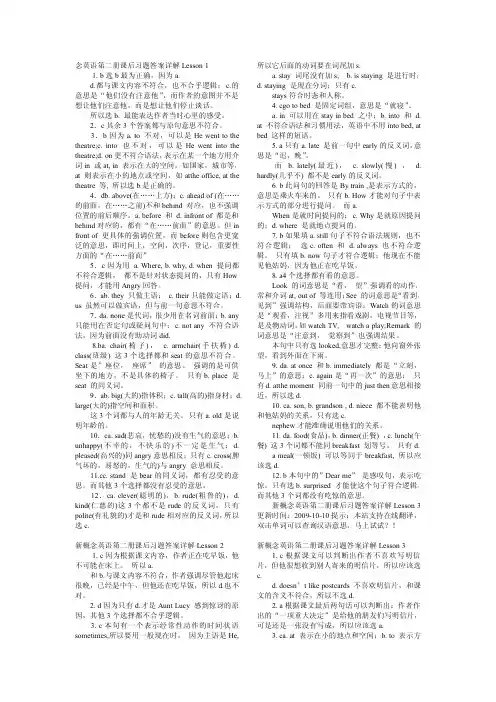
念英语第二册课后习题答案详解Lesson11.b选b最为正确。
因为a.d.都与课文内容不符合,也不合乎逻辑;c.的意思是“他们没有注意他”,而作者的意图并不是想让他们注意他,而是想让他们停止谈话。
所以选b.最能表达作者当时心里的感受。
2.c其余3个答案都与原句意思不符合。
3.b因为a.to不对,可以是He went to the theatre;c.into也不对,可以是He went into the theatre;d.on更不符合语法,表示在某一个地方用介词in或at,in表示在大的空间,如国家,城市等,at则表示在小的地点或空间,如atthe office,at the theatre等,所以选b.是正确的。
4.db.above(在……上方);c.ahead of(在……的前面,在……之前)不和behind对应,也不强调位置的前后顺序。
a.before和 d.infront of都是和behind对应的,都有“在……前面”的意思。
但in front of更具体的强调位置,而before则包含更宽泛的意思,即时间上,空间,次序,登记,重要性方面的“在……前面”5.c因为用 a.Where,b.why,d.when提问都不符合逻辑,都不是针对状态提问的,只有How 提问,才能用Angry回答。
6.ab.they只做主语;c.their只能做定语;d. us虽然可以做宾语,但与前一句意思不符合。
7.da.none是代词,很少用在名词前面;b.any 只能用在否定句或疑问句中;c.not any不符合语法,因为前面没有助动词did.8.ba.chair(椅子), c.armchair(手扶椅)d. class(班级)这3个选择都和seat的意思不符合。
Seat是”座位,座席”的意思。
强调的是可供坐下的地方,不是具体的椅子。
只有b.place是seat的同义词。
9.ab.big(大的)指体积;c.tall(高的)指身材;d. large(大的)指空间和面积。
新概念英语第二册课后习题答案详解(96课全)
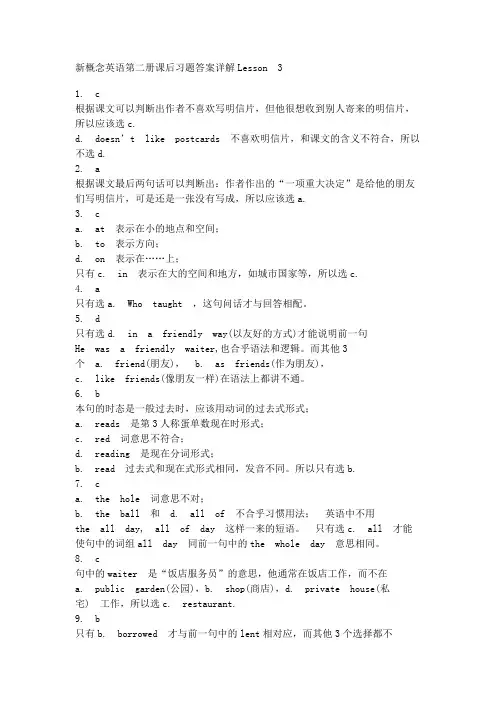
新概念英语第二册课后习题答案详解Lesson 31. c根据课文可以判断出作者不喜欢写明信片,但他很想收到别人寄来的明信片,所以应该选c.d. doesn’t like postcards 不喜欢明信片,和课文的含义不符合,所以不选d.2. a根据课文最后两句话可以判断出:作者作出的“一项重大决定”是给他的朋友们写明信片,可是还是一张没有写成,所以应该选a.3. ca. at 表示在小的地点和空间;b. to 表示方向;d. on 表示在……上;只有c. in 表示在大的空间和地方,如城市国家等,所以选c.4. a只有选a. Who taught ,这句问话才与回答相配。
5. d只有选d. in a friendly way(以友好的方式)才能说明前一句He was a friendly waiter,也合乎语法和逻辑。
而其他3个 a. friend(朋友), b. as friends(作为朋友),c. like friends(像朋友一样)在语法上都讲不通。
6. b本句的时态是一般过去时,应该用动词的过去式形式;a. reads 是第3人称蛋单数现在时形式;c. red 词意思不符合;d. reading 是现在分词形式;b. read 过去式和现在式形式相同,发音不同。
所以只有选b.7. ca. the hole 词意思不对;b. the ball 和 d. all of 不合乎习惯用法;英语中不用the all day, all of day 这样一来的短语。
只有选c. all 才能使句中的词组all day 同前一句中的the whole day 意思相同。
8. c句中的waiter 是“饭店服务员”的意思,他通常在饭店工作,而不在a. public garden(公园),b. shop(商店),d. private house(私宅) 工作,所以选c. restaurant.9. b只有b. borrowed 才与前一句中的lent相对应,而其他3个选择都不是。
新概念英语第二册课后习题答案详解
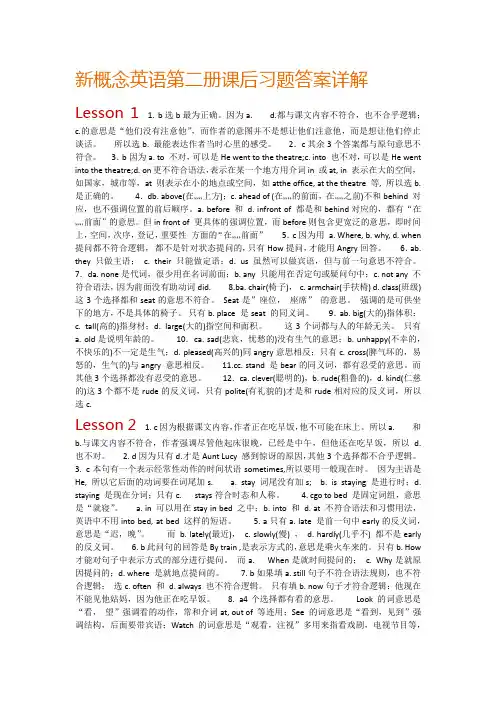
新概念英语第二册课后习题答案详解Lesson 1 1. b选b最为正确。
因为a. d.都与课文内容不符合,也不合乎逻辑;c.的意思是“他们没有注意他”,而作者的意图并不是想让他们注意他,而是想让他们停止谈话。
所以选b. 最能表达作者当时心里的感受。
2.c其余3个答案都与原句意思不符合。
3.b因为a. to 不对,可以是He went to the theatre;c. into 也不对,可以是He went into the theatre;d. on更不符合语法,表示在某一个地方用介词in 或at, in 表示在大的空间,如国家,城市等,at 则表示在小的地点或空间,如atthe office, at the theatre 等, 所以选b.是正确的。
4.db. above(在……上方);c. ahead of (在……的前面,在……之前)不和behind 对应,也不强调位置的前后顺序。
a. before 和 d. infront of 都是和behind对应的,都有“在……前面”的意思。
但in front of 更具体的强调位置,而before则包含更宽泛的意思,即时间上,空间,次序,登记,重要性方面的“在……前面”5.c因为用a. Where, b. why, d. when 提问都不符合逻辑,都不是针对状态提问的,只有How提问,才能用Angry回答。
6.ab. they 只做主语;c. their只能做定语;d. us 虽然可以做宾语,但与前一句意思不符合。
7.da. none是代词,很少用在名词前面;b. any 只能用在否定句或疑问句中;c. not any 不符合语法,因为前面没有助动词did. 8.ba. chair(椅子),c. armchair(手扶椅) d. class(班级) 这3个选择都和seat的意思不符合。
Seat是”座位,座席”的意思。
强调的是可供坐下的地方,不是具体的椅子。
新概念英语第二册全册课后习题答案详解及单元测试答案
新概念英语第二册课后习题答案详解Lesson 11. b选b最为正确。
因为a.d.都与课文内容不符合,也不合乎逻辑;c.的意思是“他们没有注意他”,而作者的意图并不是想让他们注意他,而是想让他们停止谈话。
所以选b. 最能表达作者当时心里的感受。
2.c其余3个答案都与原句意思不符合。
3.b因为a. to 不对,可以是He went to the theatre;c. into 也不对,可以是He went into the theatre;d. on更不符合语法,表示在某一个地方用介词in 或at, in 表示在大的空间,如国家,城市等,at 则表示在小的地点或空间,如atthe office, at the theatre 等, 所以选b.是正确的。
4.db. above(在……上方);c. ahead of (在……的前面,在……之前)不和behind 对应,也不强调位置的前后顺序。
a. before 和 d. infront of 都是和behind对应的,都有“在……前面”的意思。
但in front of 更具体的强调位置,而before则包含更宽泛的意思,即时间上,空间,次序,登记,重要性方面的“在……前面”5.c因为用 a. Where, b. why, d. when 提问都不符合逻辑,都不是针对状态提问的,只有How提问,才能用Angry回答。
6.ab. they 只做主语; c. their只能做定语;d. us 虽然可以做宾语,但与前一句意思不符合。
7.da. none是代词,很少用在名词前面;b. any 只能用在否定句或疑问句中;c. not any 不符合语法,因为前面没有助动词did.8.ba. chair(椅子), c. armchair(手扶椅) d. class(班级) 这3个选择都和seat的意思不符合。
Seat是”座位,座席”的意思。
强调的是可供坐下的地方,不是具体的椅子。
新概念英语第二册课后答案
新概念英语第二册课后答案Lesson 1Exercise 1: 1. John is hungry. 2. The children are hot. 3. The dog is thirsty. 4. The houses are beautiful. 5. The flowers are lovely.Exercise 2: 1. John is feeling hot. 2. John is feeling thirsty. 3. John is feeling cold. 4. John is feeling sleepy. 5. John is feeling happy.Exercise 3: 1. Is Mary thirsty? 2. Is he happy? 3. Are you cold? 4. Are the flowers lovely? 5. Is the dog sleepy?Lesson 2Exercise 1: 1. I am a doctor. 2. Mary is a student. 3. Tom and Bob are engineers. 4. The Smiths are from London. 5. We are friends.Exercise 2: 1. What do you do? 2. What does your father do?3. What does your sister do?4. What do your friends do?5. What do they do?Exercise 3: 1. My friend is a teacher. 2. His parents are doctors. 3. Her brother is a lawyer. 4. Our neighbors are engineers. 5. Their children are students.Exercise 1: 1. Can you play the piano? 2. Can Mary swim? 3. Can they speak French? 4. Can you understand English? 5. Can he drive a car?Exercise 2: 1. What can you do? 2. Can she ride a bike? 3. Can he dance? 4. Can they ski? 5. Can we sing?Exercise 3: 1. I can speak English. 2. My brother can swim. 3. Mary can play the guitar. 4. Our friends can speak Chinese. 5. The children can ride a bike.Lesson 4Exercise 1: 1. I want to buy a car. 2. She wants to go shopping. 3. They want to eat dinner. 4. He wants to watch a movie. 5. We want to travel.Exercise 2: 1. What do you want to do? 2. What does your brother want to buy? 3. What do your parents want to eat? 4. What does she want to watch? 5. What do they want to study?Exercise 3: 1. I want to visit France. 2. My friend wants to learn Spanish. 3. Mary wants to visit her grandparents. 4. Our neighbors want to buy a new house. 5. The students want to study abroad.Exercise 1: 1. I can swim. 2. She can play the piano. 3. They can speak French. 4. He can drive a car. 5. We can understand English.Exercise 2: 1. What can you do? 2. Can she ride a bike? 3. Can he dance? 4. Can they ski? 5. Can we sing?Exercise 3: 1. I can speak English. 2. My brother can swim. 3. Mary can play the guitar. 4. Our friends can speak Chinese. 5. The children can ride a bike.Lesson 6Exercise 1: 1. I like ice cream. 2. She likes to read books. 3. They like to go hiking. 4. He likes to watch movies. 5. We like to play football.Exercise 2: 1. What do you like to do? 2. What does your sister like to eat? 3. What do your friends like to watch? 4. What does he like to play? 5. What do they like to study?Exercise 3: 1. I like to travel. 2. My friend likes to play video games. 3. Mary likes to listen to music. 4. Our neighbors like to go fishing. 5. The students like to study history.ConclusionThese are the answers to the exercises in the New Concept English Book 2. It is important to practice these exercises to reinforce your understanding of the lessons. By answeringthese questions, you can improve your ability to use the English language in various contexts. Keep practicing and you will become more proficient in English!。
新概念英语第二册课后练习答案(1-20)
新概念英语第二册课后练习答案(1~20课)Lesson 11.关键句型练习A I (1) got (2) very angry (3) .I (1) could not hear (2) the actors (3) .I (1) turned round (2) .I (1) looked at (2) the man and the woman (3) angrily (4) .They (1) did not pay (2) any attention (3) .In the end (6), I (1) could not bear (2) it (3).I (1) turned round (2) again (6) .zI (1) can't hear (2) a word (3)! {I (1) said (2) angrily (4) .zIt (1) is (2) none of your business (3) , {the young man (1) said (2) rudely (4) .zThis (1) is (2) a private conversation (3)!{B 1 I enjoyed the film yesterday.2 I listened to the news carefully.3 The man played the piano well.4 The children played games quietly in their room yesterday.5 He opened the door quietly.6 He left immediately.7 He planted a tree in the corner of the garden.8 He read the letter quickly in his office before lunch.9 I borrowed a book from the library this morning.10 The cook spoilt the soup.11 We stay at home on Sundays.12 There are a lot of people at the bus stop.13 The little boy ate greedily an apple in the kitchen this morning.14 She draws beautifully.15 I like music very much.16 They built a new school in our village last year.17 The match ended at four o'clock.18 She received a letter from her brother last week.2.多项选择题答案1 b2 c3 b4 d5 c6 a7 d 8 b 9 a 10 c 11 c 12 cLesson 22.难点练习答案1 What a wonderful garden(this is) !2 What a surprise( this is) !3 What a lot of trouble he is causing!4 What wonderful actors (they are) !5 What a hard-working woman (she is) !6 What a tall building (it is) !7 What a terrible film (it is) !8 What a clever boy you are!9 What a pretty girl (she is) !10 What a strange guy (he is) !3.多项选择题答案1 c2 d3 c4 c5 a6 b7 b 8 a 9 d 10 c 11d 12 bLesson 31.关键句型练习题A went (1.1)Õvisited (1.2) Õsat(1.2) Õtaught(1.2)ÕlentÕread(1.3) Õdid notunderstandÕthought (1.4)Õpassed (1.5) Õdid not send(1.5) ÕmadeÕ go up (1.6) Õbought (1.7) Õspent(1.7) Õdid not write(1.8)C ...Roy died last year…left me…spent a lotof money…bought one or two…never went to the cinema…stayed at home…listened tomusic…often lent CDs…they kept them…lost many CDs…2.难点练习题1 He paid some money to the shopkeeper.2 He handed the prize to me.3 The waiter brought the man a bottle ofbeer.4 He sold me all his books.5 The shop assistant found me some curtain material.6 He did a big favour for me.7 She showed her new hat to her husband.8 She promised the finder a reward.9 He gave some advice to his son.10 His uncle left some money to/ for him.11 He is teaching us English.12 I bought you this bunch of flowers.13 Bring me that book please.14 He offered a cigarette to me.15 Read the first paragraph to me.16 I've ordered you some soup.17 I owe a lot of money to him.18 Pass your father the mustard.3.多项选择1c 2a 3c 4a 5d 6b7c 8c 9b 10a 11b 12bLesson 121.关键句型练习答案A will sail (1.1); shall meet (1.2); will be (1.3); will set out (11.4-5); shall have(1.5); shallsee (1.5); shall say (1.6);will be (1.6); will take part (1.7)C I shall go to the theatre Reg and I shall see the firstperformance the producer will give a short speech. He will speak to The play will bevery people will enjoy it very much.2.难点练习答案1 He is not back yet. He will be back in ten minutes.2 A new play is on at the Globe Theatre.3 When the concert was over, We went home.4 They will set out/ off very early tomorrow morning. (Here be off is also possible.)5 You can't take the exam yet. You are not up to it.6 He will be away from home for two months.7 She swam across the English Channel and set up a new world record. 3.多项选择题答案1 c2 c3 a4 d5 d6 a7 d 8 a 9 c 10 d 11 a 12 aLesson 131.关键句型练习答案A will be arriving (1.2); will be coming (1.3); will be meeting (1.4); will be singing (1.5);will be staying (1.6); will be trying (1.8)C 1 I'll be ironing the clothes.2 The train will be arriving in a few minutes.3 We'll be seeing you in the morning.4 We'll be watching the match.5 He'll be correcting exercise books.2.难点练习答案1 It's George's.2 It's Jean's.3 It's that woman's.4 I like Keats' poetry best.5 They're the children's.6 They're the soldiers'.7 I'll leave in six hours time. 8 There was a hundred pounds' worth of damage.3多线选择答案1 b2 d3 b4 c5 a6 b7 b 8 c 9 a 10 a 11a 12 dLesson 141.关键句型练习答案A 1 I drove on to the next town after I had left a small village.2 I said good morning to him in French as soon as he had got into the car.3 I had nearly reached the town, when the young man said:BDo you speak English?C 1 After she had written the letter, she went to the post office.2 After he had had dinner, he went to the cinema.3 When I had fastened my seat belt, the plane took off.4 We did not disturb him until he had finished work.5 As soon as he had left the room, I turned on the radio.6 He had been very ill before he died.D 1 regretted 2 had begun/ began 3 arrived2.难点练习答案1 Except for2 both of3 Apart from4 askedlask for5 neither oflasked3.多项选择答案1 b2 c3 a4 c5 d6 b7 c 8 b 9 c 10 b 11 b 12 bLesson 151. 关键句型练习答案A 1a The secretary told me that Mr. Harmsworth would see me.bcMr. Harmsworth will see you. d2 a Mr. Harmsworth said that business was very bad.b cBusiness is very bad.d3 a Mr. Harmsworth told me that the firm could not afford to pay such large salaries.b cThe firm cannot afford to pay such large salaries. dB 1 told would come/would be coming2 said (had) cut3 told had never played4 did he say had done/would do5 did he tell (had) bought/would buy6 said could not7 said (had) worked8 told wrote/writes/had never written9 did you say were/had been10 said would wait2.难点练习答案1 study2 office3 nervous4 afford5 irritable3.多线选择答案1d 2b 3c 4b 5c 6d7a 8d 9c 10c 11c 12bLesson 201关键句型练习答案A Fishing(1.1); catching(11.1-2); catching(1. 3); having spent(1.5); fishing(1.6);fishingˆ sitting(1.8); doing (1.9) C 1 he went out of the restaurant without paying the bill.2 She bought a pair of boots instead of getting a pair of shoes.3 She was afraid of spending the night alone.4 After hearing/having heard the news, she fainted.5 Think carefully before answering my question.6 On seeing the plane coming towards me, I dashed for cover.2难点练习答案1realized 2It'sˆunderstandˆits 3exciting 4interesting 5excit ing 6interested3多项选择答案1b 2c 3b 4b 5c 6b新概念英语第二册课后习题答案详解Lesson 21练习答案 Key to written exercises 1.关键句型练习答案A …passing planes can be heard(1.2); The airport was built (1.2); it could not be used then(1. 3); a hun dred people must have been driven away(11.4-5); this house will be knocked down by a passing pl ane(11.6-7); I have been offered a large sum of money(1.7)C 1 A message will be sent immediately. 2 All these goods must be sold.3 I told you the parcel would be received in time.4 The letter has to be delivered by hand.5 Your l etter must have been lost In the post. 2.难点练习答案 A (sample answers)The dog drove the sheep out of the field. The police drove the crowds back. I drove my car into th e garage. B1 home 2 houses 3 house 4 home 3.多项选择题答案1. c根据课文第3-4行Last year, however, it came into use, 只有c. came into use recently 比较接近课文的实际内容,而其他3个选择都不符课文内容。
新概念英语2课后选择题答案及详解
念英语第二册课后习题答案详解Lesson 1I. b选b最为正确。
因为a.d•都与课文内容不符合,也不合乎逻辑;c•的意思是“他们没有注意他”,而作者的意图并不是想让他们注意他,而是想让他们停止谈话。
所以选 b. 最能表达作者当时心里的感受。
2.c 其余3 个答案都与原句意思不符合。
3.b 因为a. to 不对,可以是He went to the theatre;c. into 也不对,可以是He went into the theatre;d. on 更不符合语法,表示在某一个地方用介词in 或at, in 表示在大的空间,如国家,城市等,at 则表示在小的地点或空间,如atthe office, at the theatre 等, 所以选b•是正确的。
4. db. above(在.. 上方);c. ahead of (在的前面,在之前)不和behind对应,也不强调位置的前后顺序。
a. before 和 d. infront of 都是和behind 对应的,都有“在. 前面”的意思。
但in front of更具体的强调位置,而before 则包含更宽泛的意思,即时间上,空间,次序,登记,重要性方面的“在 ...... 前面”5. c 因为用a. Where, b. why, d. when 提问都不符合逻辑,都不是针对状态提问的,只有How 提问,才能用Angry 回答。
6. ab. they 只做主语;c. their 只能做定语; d. us 虽然可以做宾语,但与前一句意思不符合。
7. da. none是代词,很少用在名词前面;b. any 只能用在否定句或疑问句中;c. not any 不符合语法,因为前面没有助动词did.8. ba. chair(椅子),c. armchair(手扶椅) d. class(班级)这3个选择都和seat的意思不符合。
Seat是”座位,座席”的意思。
- 1、下载文档前请自行甄别文档内容的完整性,平台不提供额外的编辑、内容补充、找答案等附加服务。
- 2、"仅部分预览"的文档,不可在线预览部分如存在完整性等问题,可反馈申请退款(可完整预览的文档不适用该条件!)。
- 3、如文档侵犯您的权益,请联系客服反馈,我们会尽快为您处理(人工客服工作时间:9:00-18:30)。
新概念英语第二册课后习题答案详解Lesson 9
练习答案 Key to written exercises
1.关键句型练习答案
A 1 We went to the Town Hall on Wednesday evening/ New Year's Eve.
2 The clock would strike twelve in twenty minutes time.
3 The clock stopped at five to twelve.
B 1 in 2 On 3 during/ in 4 in 5 at
6 on…in
7 in
8 at…in
9 until
C (sample answers)
1 The match will begin at 3 o'clock.
2 They bought their house in 1980.
3 The shop is closed from one till two.
4 The children went to school in the morning.
5 He'll finish school in two years' time.
6 Let's go for a walk in the evening.
7 He went to church on Sunday.
2.难点练习答案
A 1 No, I haven't any/ have no money.
2 No, I didn't go anywhere/ went nowhere in the holidays.
3 No, I didn't buy anything/ bought nothing this morning.
4 No, there wasn't anybody/ was nobody present when the accident happened.
B He has no hobbies. He goes nowhere. He sees nobody. He is interested in nothing----except food!
3.多项选择题答案
1. b根据课文内容第1-2行 It was the last day of the year…和第8行The big clockrefused to welcome the New Year, b 最符合课文内容,其他3个选择都不对。
2. b根据课文第4行...at five to twelve, the clockstopped.钟是在午夜前停的,但人们是在午夜后才意识到这一点的。
(It's two minutes pasttwelve!第6-7行),所以b.是对的。
a. before midnight 和课文事实不符合。
钟是在午夜前停的,但人们是在午夜后才意识到这一点的。
3. dthe evening 前需要有介词in才能构成表示时间的短语,所以选d.其他3个选择都不对。
4. apeople 是集体名词,虽然形式是单数,但意思是复数的(人民或人们),做主语时候谓语动词要用复数形式。
B. was, c. is ,d be 都不能用在people 后面做谓语动词,只有a. were 可以,所以选a.
5. a这个问句的回答是一个表示时间的短语,因此需要一个针对时间提问的疑问词。
只有a. when是针对时间提问的,而其他3个都不是问时间的。
6. b在表示钟点的时间短语前面用介词at,所以只有b. at 是对的。
7. b从回答中可以看出,这个疑问句需要一个能够针对nothing提问的词,而且要能够在疑问句中充当主语。
a.
nothing可以做主语,但一般不用在疑问句中;c. any 是量词,不能做主语;d. athing 可以做主语,用在这个问句中意思虽然通顺,但不符合习惯用法;b. anything是不定代词,可以做主语,而且只能在疑问句中做主语,所以b.是对的。
8. da. hit , b. beat, c. knock , d. strike这几个动词中都有“敲”,“打”,“击”的意思,但是只有strike 有“(钟表)敲鸣”,“报时”的含义,所以最佳选择是d.
9. b本句表示钟点的短"几点过几分"中只能用介词past,所以只有b. past 是正确的答案。
c. passed 不对,是动词pass的的过去式,一个句子里不能有两个谓语动词的。
pass是动词,而past是介词,有时用作形容词或名词。
当pass用作动词和past用作介词时,它们都有“过去”和“经过”的意思.
Three months passed and then one morning, Sam found his walletoutside his front door.
三个月过去了,后来有一天上午,山姆在自己前门的外面发现了自己的钱包。
It's two minutes past twelve.
现在是十二点过两分。
10. b只有b. an hour 是正确答案,其他选择都不符合事实。
11. d根据生活常识应该选d. watch(手表),这个句子的意思是“大多数人带手表”,这是事实。
而选a. an alarmclock(闹钟)或 c. a clock(钟表)都与事实不符合,人们总不可能随身携带着闹钟或钟。
而选b. analarm(报警器)更不符合事实。
12. c只有选c. didn’t want to (不想)才能使这个句子同前面的句子It refused to …的含义接近。
b. wanted to (想要) 和d. wished to (希望)都与前面句子意思相反。
a. denied it (否认,拒绝接受)也同前一句意思不够接近。
